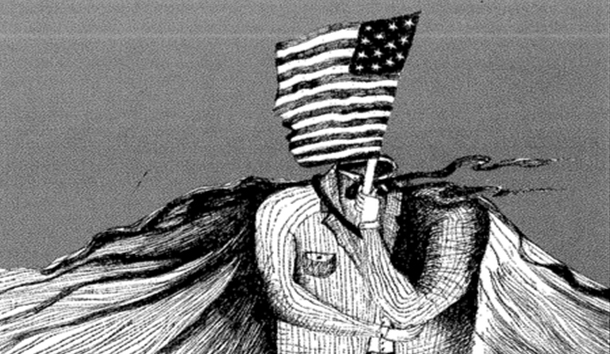From the May 1996 issue of Chronicles.

On Michael New
On January 24, I introduced a resolution condemning the court-martial in Germany of U.S. Army Specialist Michael New, who refused to wear the insignia of the United Nations on his uniform. My resolution, coauthored with Congressman Roscoe Bartlett (Republican-Maryland), calls on President Clinton to vindicate the principle under which Michael New made his refusal, to take action to override Specialist New’s conviction, and to restore Specialist New to his position in the Army with honor.
Specialist Michael New is a twice-decorated soldier. He was scheduled to go to Macedonia with his unit as part of a United Nations peacekeeping mission, and he was more than willing to serve there with his unit. Specialist New, however, refused to wear the blue beret and shoulder patch of the United Nations, basing his refusal on the fact that he had enlisted in the Army as a volunteer to protect and serve the United States—not the United Nations.
The United Nations Participation Act of 1945 prohibits the use of the U.S. Armed Forces in U.N. deployments unless Congress approves of the participation agreement in advance by appropriate act or joint resolution. The deployment of American troops to Macedonia has never been approved by Congress. Both the Constitution and existing American law prohibit members of the U.S. Armed Forces from receiving badges or insignia from a foreign government, including any international or multinational organization whose members include any unit of a foreign government, without the consent of Congress. The use of U,N. insignia and uniforms by U.S. troops has never been approved by Congress. The Army’s action in compelling Michael New to wear the U.N. insignia on his uniform was therefore unconstitutional.
What has this country come to when we allow a decorated American soldier to be court-martialed and drummed out of the Army for refusing to wear a foreign uniform? The only people who should be court-martialed are the bureaucrats in the Army who allowed Michael New to be tried and convicted. Michael New is an American hero, and I will continue to do everything I can to reverse his conviction and ensure that no American soldier is ever forced to wear a foreign uniform again.
Protecting Our Borders
Last year I introduced legislation that would authorize the Pentagon to redeploy American troops stationed in Europe to assist federal law enforcement officials patrolling America’s Southern border. Every day dangerous criminals pour into our country through our border with Mexico—unchallenged.
My bill authorizes the Secretary of Defense—at the request of the Attorney General—to transfer up to 10,000 American troops stationed in Europe back to the United States to assist the Border Patrol and the Immigration and Naturalization Service in preventing illegal aliens, drug traffickers, and terrorists from entering our country. The bill would also allow American troops to assist the Customs Service in inspecting cargo, vehicles, and aircraft at points of entry into the United States.
Let’s be candid. The Border Patrol has only 3,800 personnel to guard the two longest borders of one of the largest countries of the world. Reports indicate that, at any given time, only 800 patrolmen are available to protect our 2,000 mile border with Mexico. Congress has failed to provide funding to enlarge the Border Patrol, and until Congress can find the money, this military option is the best short-term way to address this shortage of personnel.
We have hundreds of thousands of troops deployed throughout the world protecting European, Asian, and Latin American nations. If the Pentagon can send hundreds of thousands of American troops to protect our allies, it should be able to spare 10,000 military personnel to protect America.
Foreign Aid
Last spring the House approved two of my amendments that require recipients of U.S. foreign aid to purchase American-made goods. If we are going to send money overseas. Congress should at least ensure that the aid is used to buy American products.
Specifically, my amendments required recipient countries to use U.S. foreign aid to purchase American-made commodities, services, or defense equipment. The requirement could be waived if, one, the goods purchased are made in the recipient country, or are not available in the United States or a developing country; two. Congress has specifically authorized procurement outside the United States; or, three, the President determines that procurement outside the United States would result in the more efficient use of American foreign aid.
I have also considered another amendment that would cut American foreign aid programs by five percent across the board—except for antiterrorism aid, disaster assistance, the Peace Corps, and narcotics control. This would result in a savings of $766 million.
Foreign Lobbying Laws
Last spring I testified before a House panel on behalf of my proposal to toughen federal registration requirements for foreign lobbyists. The American people have a right to know who is getting paid by foreign interests to influence our government. My bill would close the loopholes that exist in current law and end the secrecy surrounding foreign lobbying.
According to a 1990 General Accounting Office report on the Foreign Agents Registration Act of 1938 (FARA), of the thousands of known foreign lobbyists in the country, only 775 foreign agents actually registered with the Justice Department. The report detailed a number of other problems associated with FARA. Unfortunately, since the report was released, neither the Justice Department nor Congress has rectified this breach of security.
FARA requires foreign agents to disclose their connections with foreign governments, foreign political parties, and other foreign principals to the Justice Department’s Foreign Agents Registration Unit. The term “foreign agent” was originally used to identify foreign principals in America who were spreading foreign propaganda and organizing political activities. As a result, many individuals and law firms representing foreign interests are exempt from registration under the act. My bill substitutes the term “representative of a foreign interest” for “foreign agent,” thus broadening the definition and closing a loophole. FARA also provides certain exemptions to registration including commercial activities. Foreign agents, for example, are not required to notify the Justice Department’s Registration Unit to claim an exemption, making it difficult for the Justice Department to determine who should be registered.
All such exemptions need to be terminated. My bill also cracks down on those foreign agents who fail to register with the Justice Department in a timely fashion, which is a serious problem today. Of the 28 registration statements reviewed in the GAO report, a whopping 68 percent had not registered on time. My bill would subject any person who has failed to file, omitted information, or lied about the facts of his foreign lobbying to a minimum fine of $2,000 and a maximum fine of one million dollars.
Buy American
In June 1995, the House approved my Buy American amendment to legislation authorizing funds for the Pentagon. My amendment was designed to end preferential treatment in Pentagon procurements for products made in countries that discriminate against American firms. The thrust of my amendment is very simple: countries that keep their government contracts off-limits to American firms will get the same treatment from Uncle Sam.
The United States has entered into a number of bilateral and multilateral trade agreements, such as the General Agreement on Tariffs and Trade and the North American Free Trade Agreement. Companies from countries that have signed these agreements can get preferential treatment when bidding on American government contracts. Under my amendment, if a country discriminates against American firms, the Pentagon terminates the preferential treatment in procurement for products made in that country.
Fair Trade
I am the ranking Democrat on the Coast Guard and Maritime Transportation Subcommittee, and last summer the House approved my provisions to the “Ocean Shipping Reform Act of 1995.” The bill deregulates the ocean shipping industry and would eliminate the Federal Maritime Commission, the independent federal agency that currently regulates ocean shipping, by the end of fiscal year 1997. The FMC’s remaining functions would be transferred to the United States Department of Transportation.
My provision strengthens federal laws governing unfair trade practices of foreign carriers and governments. It targets foreign carriers that are financially or organizationally affiliated with large, diversified, but vertically integrated interests. Carriers owned and operated in this fashion are like government-owned carriers, in that they may not have a pure profit motive—giving them an unfair competitive advantage. Current law does not allow our government to take action against these types of foreign carriers if they engage in unfair pricing practices that harm American shippers. It also gives the DOT the authority to take action against these carriers.
Some foreign shippers and at least one American newspaper have raised concerns about my provision. They have the mistaken impression that my provision allows the United States government to regulate the rates of foreign ship lines suspected of unfair pricing. This is not the case. My provision allows the U.S. Secretary of Transportation—after an investigation and public hearing—to seek remedies if the secretary finds that an ocean carrier is or has been financially affiliated with nontransportation entities—government or private—in such a way that disadvantages American carriers. The remedies authorized under my provision are the same as currently exist for government-controlled carriers that are engaging in unfair practices. Why should unfair or anticompetitive marketplace behavior by one class of carriers be treated any differently from that of another?
Some have also suggested that my provision was prompted by pressure from the American shipping lobby. Such accusations are insulting, to say the least. Anyone who has followed my career knows that I have been an outspoken and active voice for strong government action to combat illegal and damaging foreign trade practices. In working with my Republican colleagues on this legislation, one of my main interests was ensuring that deregulation of the ocean shipping industry and the elimination of the FMC did not result in a diminished effort by the United States to fight foreign carriers that engaged in unfair and predatory trade practices. That was the only driving force behind my amendment. American carriers and shippers learned of my provision only after a draft of the bill was supplied to their representatives, and to every other ocean shipping interest. I am pleased, however, that they support my provision.
As far as the protests of foreign shipping line executives are concerned, I have this message: play fair and you’ll have nothing to worry about.

Leave a Reply